|
|
|
Sort Order |
|
|
|
Items / Page
|
|
|
|
|
|
|
| Srl | Item |
| 1 |
ID:
192539


|
|
|
|
|
| Summary/Abstract |
China remains reluctant in claiming unilateral economic sanctions as a valid form of statecraft. China has consistently withheld official acknowledgment of its use of unilateral sanctions despite using them in different disputes. This has resulted to observations arguing that China is increasingly approaching the use of sanctions in a stealthier, therefore, more aggressive manner. It begs to ask, how does China’s reluctant attitude towards its use of unilateral economic sanctions fit into China’s overall foreign policy logic? More specifically, how does China’s victimhood discourse justify unilateral sanctions and at the same time, promote a positive identity of itself in light of coercion? This paper argues that China’s consistent vague acknowledgment and denial in claiming a direct hand on unilateral sanctions comes from its broad foreign policy objective of maintaining a positive identity through its discourse of victimhood. To uncover this understanding, this paper analyzes China’s official positions in six bilateral disputes where China has resorted to unilateral sanctions. While existing observations only stop at ‘plausible deniability’ as primary explanation for China’s vague rhetoric, analyzing China’s predication strategies provides a necessary nuancing in terms of how this peculiar behavior remains consistent with China’s overall foreign policy logic.
|
|
|
|
|
|
|
|
|
|
|
|
|
|
|
|
| 2 |
ID:
192540


|
|
|
|
|
| Summary/Abstract |
This research sheds light on the structural causes of the complex and often seemingly contradictory aspects of junior allies’ behavior in an era of global power rivalry. These relatively smaller US allies must deepen cooperation with the US to address some critical security challenges that cannot be dealt with alone, but have failed in three key ways. First, the less capable the US becomes via dwindling resources reserved for meeting allied security needs, the more likely the allied dependence on US military protection is proportionately reduced in the absence of viable alternatives. Second, China’s attempts to drive a wedge between the US and its allies compounds the perception of disunity that results in allied dependence being significantly reduced. Lastly, the smaller states have limited capacity to create a buffer to navigate the rivalry between the two larger nations. Two case studies, the US-ROK and US-Philippines alliances, indicate how junior allied behavior can be seen as contradictory to the allies’ own interests as a consequence of assuming tradeoffs that result from reacting to both major powers’ policy choices, which, in turn, undermines the ability of the smaller states to determine their own security policies.
|
|
|
|
|
|
|
|
|
|
|
|
|
|
|
|
| 3 |
ID:
192541
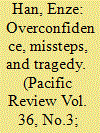

|
|
|
|
|
| Summary/Abstract |
This paper makes a novel contribution by examining the puzzle of one Southeast Asian nation, Myanmar, and its dramatic shift of ‘fortune’ in its international status and the domestic consequences of that shift during the decade of 2010–2020. It highlights how the country’s changing international relations affected its domestic political decision-making process. It puts forth the argument that the amount of international attention the country received since 2011 as the target of competitive courtship between China, United States, and the West in general, and the consequent feeling of being valued as a geostrategic asset, created strong conditions for overconfidence on part of Myanmar’s government and military. This favorable international environment also coincided with perceived progress in democratization domestically. Similar to its past patterns of behavior toward ethnic minorities, the Myanmar military and the government overestimated their likelihood of success in dealing with the Rohingya minority while underestimating the likelihood of punishment by the international community.
|
|
|
|
|
|
|
|
|
|
|
|
|
|
|
|
| 4 |
ID:
192542
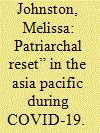

|
|
|
|
|
| Summary/Abstract |
COVID-19 has disrupted social, economic and political life across the Asia Pacific region, with particularly deleterious impacts on women. Rather than equitably affecting all, COVID-19 has brought about a “patriarchal reset”, exacerbating women’s health and care labour burdens and heightening the physical violence against women and other threats to women’s human rights. This paper examines global health governance in the region from a feminist political economy perspective. We ask how has the pandemic and associated lockdowns affected women’s safety and access to economic resources and services on the one hand, and ‘women, peace and security’ (WPS) practitioners’ capacity to safeguard women’s rights in fragile settings on the other hand? We examine the gendered impacts of COVID-19 based on two surveys of WPS practitioners during 2020. Significant rises in domestic and gender-based violence, reduced access to reproductive health services, and increased income insecurity were all perceived and/or experienced during COVID-19 restrictions. WPS practitioners delivered services to mitigate these effects of COVID-19 despite overall less funding than before COVID-19. With the benefit of primary data, we explore how a more radical approach is needed to understand and transform gender relations in light of gender-based violence and depletion of women’s labour.
|
|
|
|
|
|
|
|
|
|
|
|
|
|
|
|
| 5 |
ID:
192537
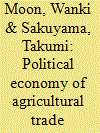

|
|
|
|
|
| Summary/Abstract |
This paper contrasts agricultural protection of Japan and Korea with the West and identifies major differences between them. It characterizes agricultural protection of Japan and Korea (net heavy food importers) as “tariff-based and scarcity-sensitive” aimed at promoting survival and the West (net food exporters) as “subsidy-based and surplus-inducing” aimed at enhancing farm income. We then identify factors underlying the coevolution and divergence in the extent of agricultural trade liberalization between Japan and Korea since the launch of the Uruguay Round in 1986. Korea accepted deep cuts in agricultural tariffs in bilateral FTAs with the US and EU during the 2000s while Japan continued to protect farm interests by concluding low levels of FTAs with politically sensitive products excluded from tariff concessions. The two countries’ stances reversed since 2013 with Japan becoming proactive in pursuing high levels of FTAs with major agricultural exporting countries and Korea decelerating its opening of agricultural markets. To explain such divergences, this paper develops a political economy framework in which the incumbent political leadership would consider both national interests and sectoral (farm as import competing industries and business/manufacturing as exporting industries) special interests. Our analysis shows that President Roh (2002–2007)’s embracing of neoliberal paradigm in formulating foreign trade policies that would promote national interests underlies the unprecedented level of agricultural trade liberalization in Korea during the 2000s, while Prime Minister Shinzo Abe’s determination not to be outcompeted by the rising China and Korea’s ambitious FTA strategies underlies Japan’s proactive bilateral and mega-FTA drives since 2013.
|
|
|
|
|
|
|
|
|
|
|
|
|
|
|
|
| 6 |
ID:
192544


|
|
|
|
|
| Summary/Abstract |
Political economy impacts and influences a state's military strategy. This article focuses on how the integration of the US political economy in the Indo-Pacific drives US Navy officers and the broader national security state to establish the Free and Open Indo-Pacific (FOIP). Investigating the strategic thought of senior Naval officers shows that they think far beyond military threats and engage with the United States and the Indo-Pacific political economy. Even as the US Navy competes with China's military, its FOIP strategy benefits corporate elites in both China and the US, whose cooperation creates a mutually supportive economic relationship. This argument leads to the finding that the US hegemony in the region is a strategy that avoids a bipolar 'New Cold War' of an entirely de-coupled US and China. The FOIP supported by the US Navy continues to integrate China into regional and global economies, even as it attempts to push back against China by gathering allies and partners. The emphasis on international political economy highlights how the region is a network of 'patchwork' relations, where states rely on one another for economic prosperity. Through investigating speeches and strategic papers from US Naval officials, this paper demonstrates how the US competes and cooperates with China in the context of relations in the region that are in constant flux.
|
|
|
|
|
|
|
|
|
|
|
|
|
|
|
|
| 7 |
ID:
192536
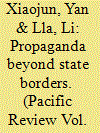

|
|
|
|
|
| Summary/Abstract |
Today, authoritarian states, such as that of China, strive to cultivate political allegiance among their diasporic subjects through state-run propaganda operations beyond national borders. Aiming to construct a stable, exclusive, and institutionalized diasporic network of influence within host societies, autocratic states use extraterritorial propaganda to amass integrative capacity by dispersing carefully tailored discourses, penalizing opposing voices, promoting a unified interpretive framework for conceptualizing socio-political reality, forming a standard meaning system for diasporic communities, coordinating collective action, and forging an integrated patriotic identity through the repetition of codified communication. The early 21st century has witnessed the rise of pro-regime solidarity among diasporic Chinese, a global force buttressing China’s communist regime. In this article, we argue that this unprecedented forging of solidarity is the product of China’s extra-territorial propaganda. The ruling party-state consistently uses concise, catchy, and carefully tailored symbolic resources, such as ‘China insult’ (ruhua) incidents, to extend its political influence beyond national borders. This poses novel challenges to the Westphalian sovereign state. The state’s tactic overseas propaganda operations have facilitated the emergence of an extraterritorial Chinese ‘symbolic state’ that relies on shared symbolism and identity, rather than territorially defined Weberian coercion, to project control over a transnational socio-political domain.
|
|
|
|
|
|
|
|
|
|
|
|
|
|
|
|
| 8 |
ID:
192543
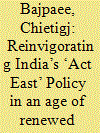

|
|
|
|
|
| Summary/Abstract |
The year 2022 marks three decades of India’s ‘Look East’ Policy (renamed the ‘Act East’ Policy in 2014). The policy emerged in the aftermath of the Cold War amid efforts by New Delhi to revive the importance of Southeast Asia (and later East Asia and the broader Indo-Pacific region) in India’s foreign policy agenda. While the policy has proven to be resilient as a core component of India’s foreign policy agenda, looking ahead it faces three key challenges: domestically, India’s reform agenda failing to match the country’s foreign policy aspirations; regionally, the principle of ‘ASEAN centrality’ coming under growing scrutiny; and globally, an international order in flux amid a more pronounced rivalry between the United States and China (which has been exacerbated by the Russian invasion of Ukraine). Addressing these issues will be key to maintaining the relevance of India’s ‘Act East’ Policy as it enters its next phase.
|
|
|
|
|
|
|
|
|
|
|
|
|
|
|
|
| 9 |
ID:
192538
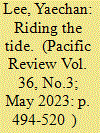

|
|
|
|
|
| Summary/Abstract |
This article examines how South Korea has used the ASEAN Plus security platforms to hedge between the US and China and why it has not participated in the FOIP strategy. It argues that the platforms’ neutral guise, owing to ASEAN centrality and their global norms-based agenda has allowed Korea to passively voice its alignment with the US, thereby answering to the pressure for a higher commitment from the US and clearing the political risk of linking the alignment decision to its own views. It asserts, therefore, that access to effective multilateral security platforms allows higher leverage to the weaker ally in an asymmetric alliance relationship.
|
|
|
|
|
|
|
|
|
|
|
|
|
|
|
|
|
|
|
|
|